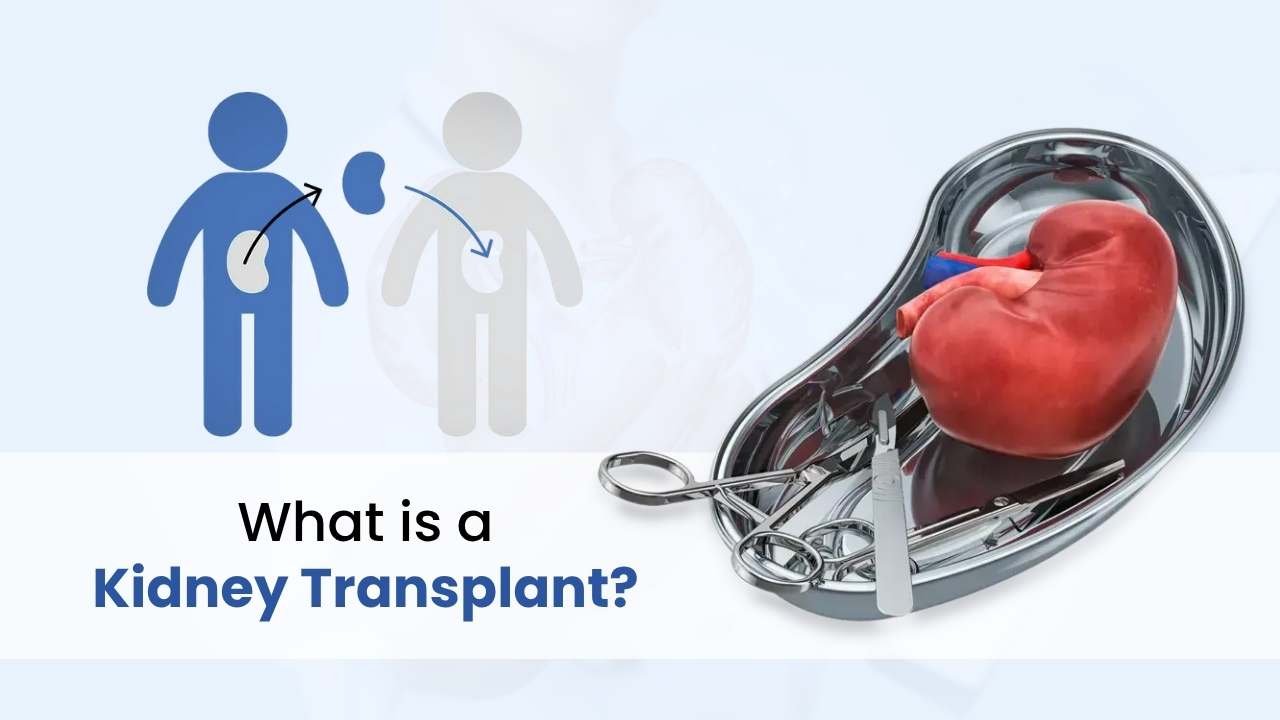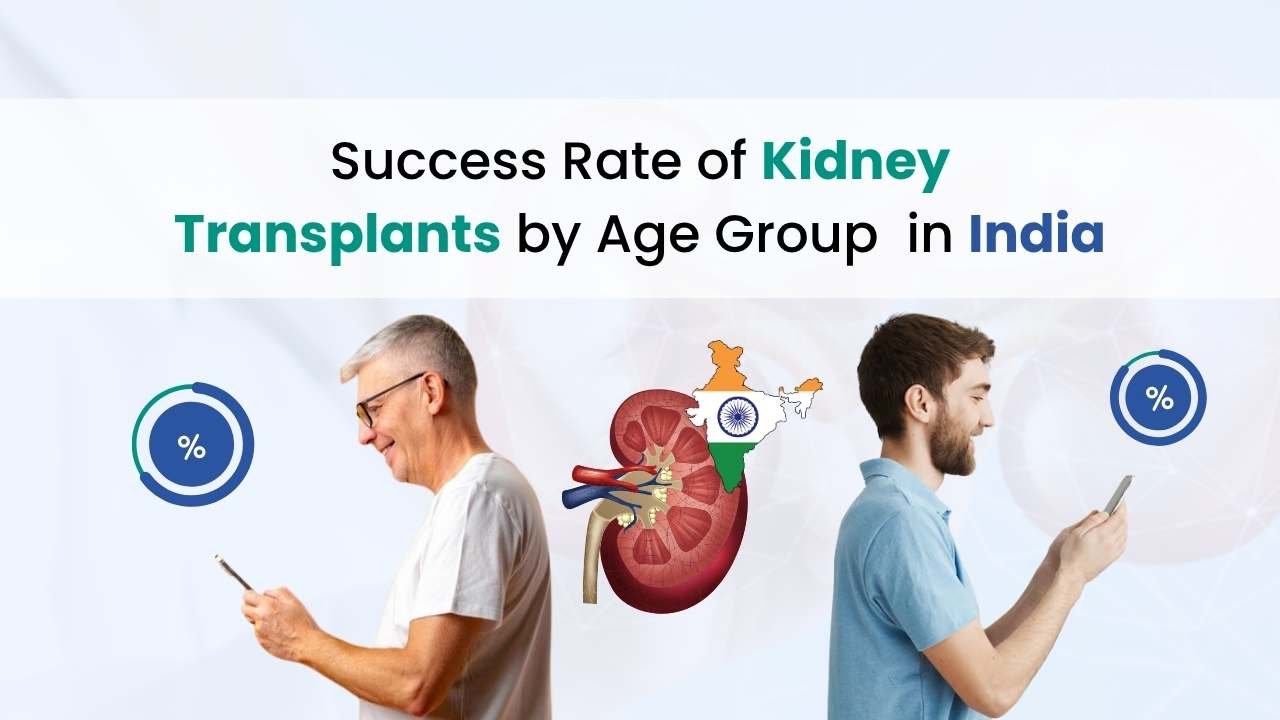Home Blogs Organ Transplant Kidney Transplant in India: Success Rate by Age Group

Do you need a kidney transplant?
Want to know the success rate for the same?
Read ahead to know the success rate according to your age.
The surgical replacement of a sick kidney with a healthy kidney from a donor is known as a kidney transplant. Both living and deceased donors are possible sources for the kidney. One of their kidneys might be donated by relatives or other qualified individuals.

Kidney transplant is a surgical procedure in which a healthy kidney from a living or deceased donor is surgically placed into a patient whose kidneys are no longer functioning normally in a kidney transplant.
When the kidneys are not able to filter the fluids and waste products, toxic amounts build up in the body, which causes an increase in blood pressure and kidney failure. When the kidneys have lost roughly 90% of their capacity to function normally, end-stage renal disease is present.
The following are the causes of end-stage renal disease:

97% of kidney transplants with living donors were successful after one year, and 86% were successful after five years.
Individuals who have received a kidney have a slightly higher 5-year survival rate. 81% of kidney transplant recipients over 65 and 90.9% of those between the ages of 35 and 49 survive for at least five years.
Success Rate according to age group is as follows:
Although they are young, this age group is more likely than other age groups to experience transplant failure, potentially as a result of things like non-adherence to prescribed treatment plans.
The success rate according to the age group 14-30 is good.
The success rate is lower than in younger individuals because comorbidities rise with aging.
As people age, success rates decrease, possibly as a result of the rising incidence of chronic illnesses.
The success rate according to the age group 30-65 is fair.
Research suggests that although short-term results are positive, older patients' long-term transplant survival drops more sharply, possibly as a result of age-related health problems.
There is a chance of serious problems following kidney transplant surgery, such as:
You can get a transplant if you have the following conditions:
You may not be suitable for a kidney transplant if you have the following conditions:
FAQs
Yes, with appropriate post-operative care, regular follow-ups, and following certain protocols, you can live a normal life.
Stronger immunosuppressive medications are used as treatment. Rejection of a transplant can be successfully treated if detected early. Although it is uncommon, rejection can result in an organ's total failure. However, the kind of rejection you have will determine the course of treatment.
The average kidney transplant cost in India is between 13000 and 14500 USD.
An individual's life can be extended by many years with a kidney transplant. From a donor, the kidney usually lasts 8 to 12 years, but from a live donor usually lasts from 12 - 20 years. Throughout their lives, some people receive many kidney transplants.
According to data, the best age to donate a kidney is 30-50 years. The younger the person, the greater the chances of rejection due to the younger immune system.
Around 25-35 percent of kidney function is lost, hence the other kidney has to make up for it.
The life expectancy of the donor is not much impacted.
Pre-transplant package and 5-7 dialysis sessions included. The recipient has to stay for 10 days, and the donor has to stay for 6 days.
For 2-4 weeks, you won't be allowed to drive or move anything heavier than 10 pounds. If there are no difficulties, you might be able to return to light work in 6 to 8 weeks. You can ask questions about what you can and cannot do while recovering after a kidney transplant from your nurse coordinator.
Daily aerobic, or cardio exercises like stair climbing, running, cycling, or football will keep your heart and lungs healthy. Strengthening your muscles and bones requires weight-bearing workouts like walking or lifting modest weights (at least three times per week).
There is a chance of serious problems following kidney transplant surgery, such as:
• Blood and blood clots.
• Leakage from or obstruction of the ureter, which connects the kidney to the bladder.
• Infection.
• The donor kidney's performance or rejection.
• From the donated kidney, there is a risk of infection or malignancy.
• Heart attacks and strokes.

Written By
A hard working, patient centred, skillful and knowledgeable doctor who is always ready to learn.
From a very young age she aspired to be in the medical field, to help cure the ailing. She believes that relief on the patient's face, the smile of gratitude and the feeling of helping someone is all what matters.
SOURCE
HISTORY
At Mejocare, we prioritize accuracy and reliability. Our content is based on peer-reviewed studies, academic research, and medical associations. We avoid tertiary references. Learn more in our editorial policy. Trustworthy health information for you.
https://www.hopkinsmedicine.org/health/treatment-tests-and-therapies/kidney-transplant 1st para https://www.med.unc.edu/surgery/transplant/forpatients/kandp/indications-contraindications/ para 1 and 3 https://www.healthline.com/health/kidney-transplant-success-rates para 2 under topic 2 https://www.healthline.com/health/kidney-transplant-success-rates para 6
CURRENT VERSION
Our care team can help you.
